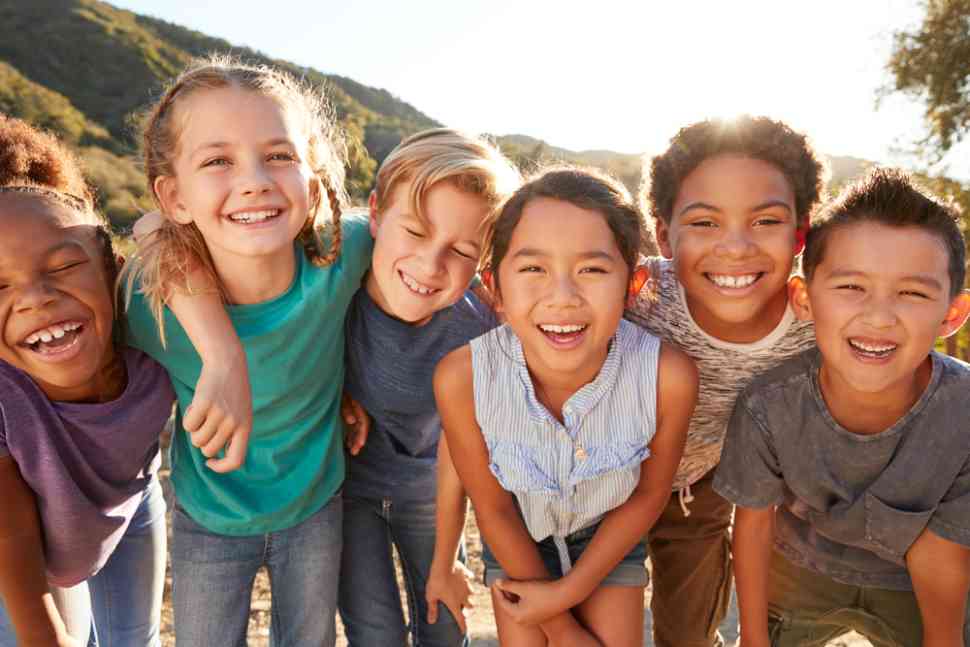Why Kids Laugh More Than Adults – A Real And Universal Phenomenon

Portrait of kids smiling at the camera
Adults are more serious than kids, and this is a common truth in all places and all years around the globe. Laughter is not the only thing that seems to be getting reduced—smiling and crying follow the same pattern. It is as if kids live a more ”condensed” life than grown-ups, where everything is experienced with passion. Take a look at your family pictures and see how often you see smiley faces on children and how many times you see that on adults. It is interesting to even focus on yourself and notice how your facial expressions have changed throughout the years.
Four main reasons cause kids often give genuine smiles and steal our hearts; let’s find them out:
- Humour is a part of their development.
Things that make us laugh are often things we don’t know about. Laughter is a reaction to our attempt to explain what we yet do not understand. It also allows us to accept situations that we are still not familiar with. Great comedians say that comedy is a big pot of forgiveness. Humor has this great way of taking the guilt away from things and making us feel better instead of feeling that we or the world around us is wrong. The more familiar we find things around us, the less possible it is to react to them. Adults have flat reactions because they are not experiencing the surprise that young kids do. How can you laugh at something you already know? The same thing applies to other responses, such as crying. Grown-ups are generally more prepared. The element of surprise is what causes unique reactions. Adults practically do not react because they don’t experience the events as the kids do. - Children have more free and social time.
Kids do not only have more free time, but they also have the opportunity to spend this time with others. Since humor is a team game, this leads to the direct conclusion that they have more chances to have fun and laugh at each other’s jokes. Laughing involves social activities and connections, which are statistically offered to young people more times, and school plays another critical role at this point. Even when they do not have free time, they have the chance to ”work” in a collaborative environment, the school. School is full of opportunities for communication, and when communication is developed so laughter will eventually take place too. - Kids and toddlers don’t have any filters.
One thing that evolves as we grow up is guilt. The moments and the jokes we choose to laugh at tell a lot about our personalities and can give away the way we think. In a world where we spend a serious amount of time hiding our real feelings and perspective, a spontaneous reaction like laughter may seem like a threat to us. We are quite absorbed with what others think of us that we forget to think about where we stand during this whole process. Kids, on the other hand, are focused on discovering new things. This doesn’t happen because kids are cooler than adults. It is a totally normal phenomenon. Kids are absorbed with exploring the world because it is a part of the process for their survival. Kids are generally much more vulnerable and fragile, so understanding how things work is important, even on a social level. - Adults are generally more worried.
Stress is a parameter that can strongly influence our tendency to laugh. As we grow up, life becomes more complex, and we become responsible for the turnout of events in our lives. Other things take the place of laughter and learning. We become the ones who have to pass our wisdom to the next generation and take care of their well-being. This doesn’t leave much space for things that are not so crucial. While laughter is vital for kids and their development, it is not equally vital for adults. What dominates in each period of our lives and the whole existence is what is essential, and as long as the significance of laughing reduces, so is the action of laughing too.
Bring the best of the CEOWORLD magazine's global journalism to audiences in the United States and around the world. - Add CEOWORLD magazine to your Google News feed.
Follow CEOWORLD magazine headlines on: Google News, LinkedIn, Twitter, and Facebook.
Copyright 2025 The CEOWORLD magazine. All rights reserved. This material (and any extract from it) must not be copied, redistributed or placed on any website, without CEOWORLD magazine' prior written consent. For media queries, please contact: info@ceoworld.biz








